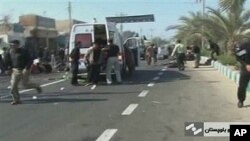Iranian media report suicide bombers have killed at least 39 people in Chahbahar, a mainly Sunni city in troubled Sistan-Baluchistan province. More than 50 other people were wounded in the attack, which occurred at a mosque where people were marking the eve of the key Shi'ite holy day.
Reports say the militant group Jundullah has taken responsibility for the carnage.
Worshippers had been gathering at the mosque in Chahbahar on the eve of Ashura, which marks the death of Shi'ite martyr Imam Hussein, grandson of the Prophet Mohammad.
One of those taking part in the ceremony, identified only as Rahimi, condemned the violence. Rahami says the goal of the attack is to divide Muslims and incite differences among them.
Shi'ites celebrating the holy day have been frequent targets during Ashura, especially those making pilgrimage to Iraq, where Hussein died.
Authorities say they have arrested someone they describe as a ringleader of the attack.
Jundullah has carried out high-profile attacks in the past, including violence at mosques and gatherings of Iran's Republican Guard. The government had hoped the group was weakened after it executed its leader, Abdolmalek Rigi, in June.
Iran had in the past accused the United States of aiding Jundullah, but Washington recently also designated it a terrorist organization.
Although Chahbahar is a relatively peaceful, prosperous city, it lies in impoverished Sistan-Baluchistan, a mainly Sunni province in the Shi'ite-run republic. The area borders Pakistan, and is also known as a transit point for drug and arms smuggling.
As for Jundullah, analyst Ali Nourizadeh of the Arab Iranian Studies Center in London says the group has gone far beyond its stated goals of greater recognition from the government of Tehran.
"I think we are now dealing with an organization, which considers itself like some organization like the Taliban," said Nourizadeh. "They want to liberate Baluchistan and they want to fight the regime. But I believe if the regime [would] be a bit kinder with them, to release their prisoners and to talk to them, they will stop turning to violence."
Sistan-Baluchistan is not the only area of concern for Iranian leaders. Iran, despite its seemingly monolithic government, has an extremely diverse citizenry. Ethnic Persians make up only about half of the population. Nearly a quarter of Iranians are ethnic Azeris, while there are many smaller ethnic groups, including Kurds, Arabs, Baluch and Turkmen.
Analyst Nourizadeh says those other groups have not shown the tendency toward violence that the Balochi Jundallah has displayed.
"But it may encourage some of those minorities, among minorities those who believe in separation, separate state and all of this, in some areas of Iran to raise arms. And that is why I am worried about minorities turning to arms in order to achieve their goals," said Nourizadeh.
Given the Iranian government's lack of dialogue with political minorities, it is far from clear what efforts it will make to reach out to the countries ethnic groups.




